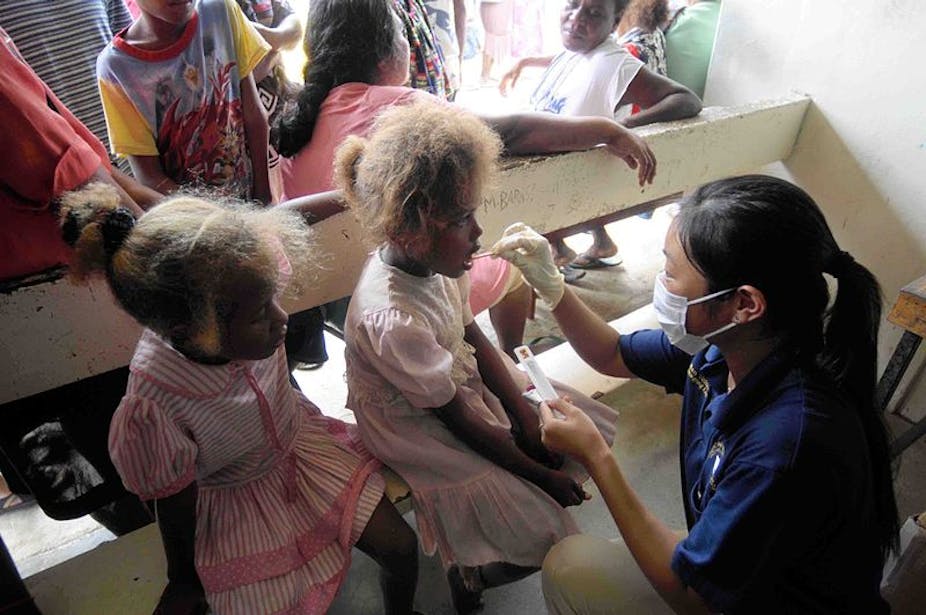Australia is taking a strong stance to protect its health and medicines policies during negotiations for the new regional trade agreement, the Trans Pacific Partnership Agreement (TPP). This negotiating position will nevertheless undermine health in developing countries unless we take an equally strong position to support and protect our neighbours.
Countries party to the TPP currently include Australia, Brunei, Chile, Malaysia, Peru, New Zealand, Singapore, the United States and Vietnam. Japan, Mexico and Canada are also engaged in discussions with a view to joining. Talks for the 11th round of negotiations concluded in Melbourne on 9 March, and there’s pressure to conclude the agreement as soon as possible.
The TPP will provide a template for future trade deals, and decisions made in the next few months between the nine TPP countries will have long-term ramifications for health around the world. Many areas of the agreement will have an impact on health and medicines policies, but there are two chapters that could have particularly dire consequences for health.
First, leaked negotiating texts show the United States is seeking expanded intellectual property protections for pharmaceutical products that would severely delay and restrict access to affordable medicines in TPP countries.

Australia’s position is that it won’t accept provisions in the TPP that affect the integrity of the Pharmaceutical Benefits Scheme (PBS). Extending intellectual property rights beyond the status quo would keep medicines under patent for longer, broaden the application of patenting, delay the introduction of cheaper generic medicines and add substantially to the costs of the PBS. So it’s unlikely that Australia will accept stronger intellectual property provisions than those consistent with the Australia-US Free Trade Agreement (AUSFTA), which came into effect in 2005.
Good news? Not for developing countries. AUSFTA contains tougher intellectual property provisions than those already in place in the developing country parties to the TPP. If the AUSFTA provisions were taken as the baseline for the agreement, countries such as Vietnam and Malaysia would no longer be able to use safeguards under the World Trade Organization (WTO) TRIPS (Trade Related Aspects of Intellectual Property Rights) Agreement, which currently provide them with access to affordable generic versions of medicines.
Many of the provisions the United States is seeking for the intellectual property chapter will delay the availability of generic medicines in developing countries, even if they don’t change the situation in Australia.
Second, a proposed investment chapter for the TPP reportedly contains an investor state dispute settlement (ISDS) clause that will enable foreign corporations to challenge legitimate health, social and environmental policies in international tribunals.
Australia is already having a painful experience with this type of clause – tobacco company Philip Morris Asia has commenced arbitration against the Australian government over its new plain packaging for tobacco products laws using a similar clause in an investment treaty between Australia and Hong Kong.

Wisely, Australia has decided it will no longer accept ISDS clauses in trade agreements, and it’s likely that we’ll negotiate an exemption for the clause. This would mean the clause wouldn’t apply to Australia, but would still apply to other countries.
Developing countries will be more reluctant to seek such an exemption as they have far less bargaining power in the negotiating room. And they’re also far less able to manage the costs of expensive legal claims initiated by large corporations. So an ISDS clause in the TPP would likely deter developing countries from introducing important public health policies, such as tobacco plain packaging.
To protect health in developing countries of the region, Australia would firstly need to insist that the TPP does not extend intellectual property rights beyond the WTO’s TRIPS Agreement. Secondly, Australia would need to refuse to sign the TPP if it contains an ISDS clause applying to Vietnam, Malaysia, Peru, Chile or Brunei.
To take such action would be bold but it would be consistent with Australia’s global leadership role in public health, its interests as a donor in the region and its commitments under several international declarations. More importantly, it’s the right thing to do.

